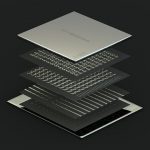Could quantum sensor technology usher in GPS-free navigation?

(GeoWeekNews) Sandia National Laboratories has developed a device that could become a pivotal component of next-generation GPS-free navigation systems.
The device was described earlier this year in the journal AVS Quantum Science. The chamber is a titanium cube, 1.6 inches across, with a circular window on each face. Several tubular appendages come out of the corners, that contain the passive pumping devices and a source of rubidium atoms. Inside this chamber Sandia, is making something called a magneto-optical trap where millions of atoms are trapped at ultra-cold temperatures 1/10,000th of a degree above absolute zero.
This avocado-sized vacuum chamber is the first device that is small, energy-efficient and reliable enough to potentially move quantum sensors — sensors that use quantum mechanics to outperform conventional technologies — from the lab into commercial use.
Countless devices around the world use GPS for wayfinding, which is made possible by atomic clocks known for extremely accurate timekeeping that hold the network of satellites perfectly in sync. But GPS signals can be jammed or spoofed, potentially disabling navigation systems on commercial and military vehicles alike. So instead of relying on satellites, future vehicles might keep track of their own position. They could do that with on-board devices as accurate as atomic clocks, but that measure acceleration and rotation by shining lasers into small clouds of rubidium gas like the one Sandia has contained.
Self-driving cars would be a good application for quantum sensor technology, in order to avoid losing navigation capability of a self-driving car when it goes into a parking garage, or really any time it loses GPS signal. But any vehicle (land, air, sea, or space) could make use of inertial navigation. One could also see applications for measuring gravitational field changes, such as those found near oil fields.
This technology most likely would not replace GPS. This is because inertial sensors (devices that measure acceleration and rotation) drift over time and only provide a relative position. Since GPS provides absolute position, it is unlikely to be replaced. However, since GPS is not available in all locations and can be jammed, inertial sensors are very important for applications where a GPS outage could be catastrophic, for example, a plane coming in for a landing.























